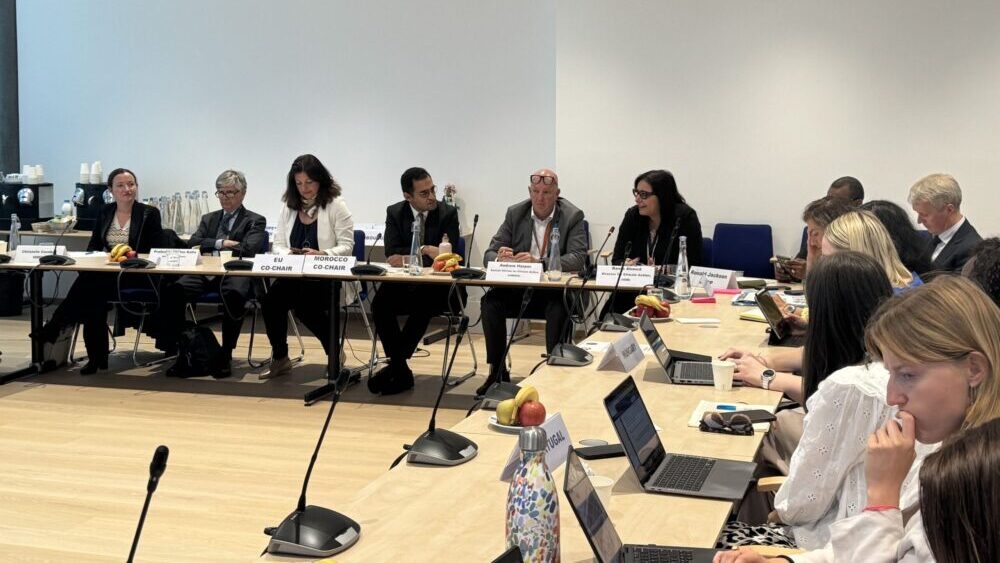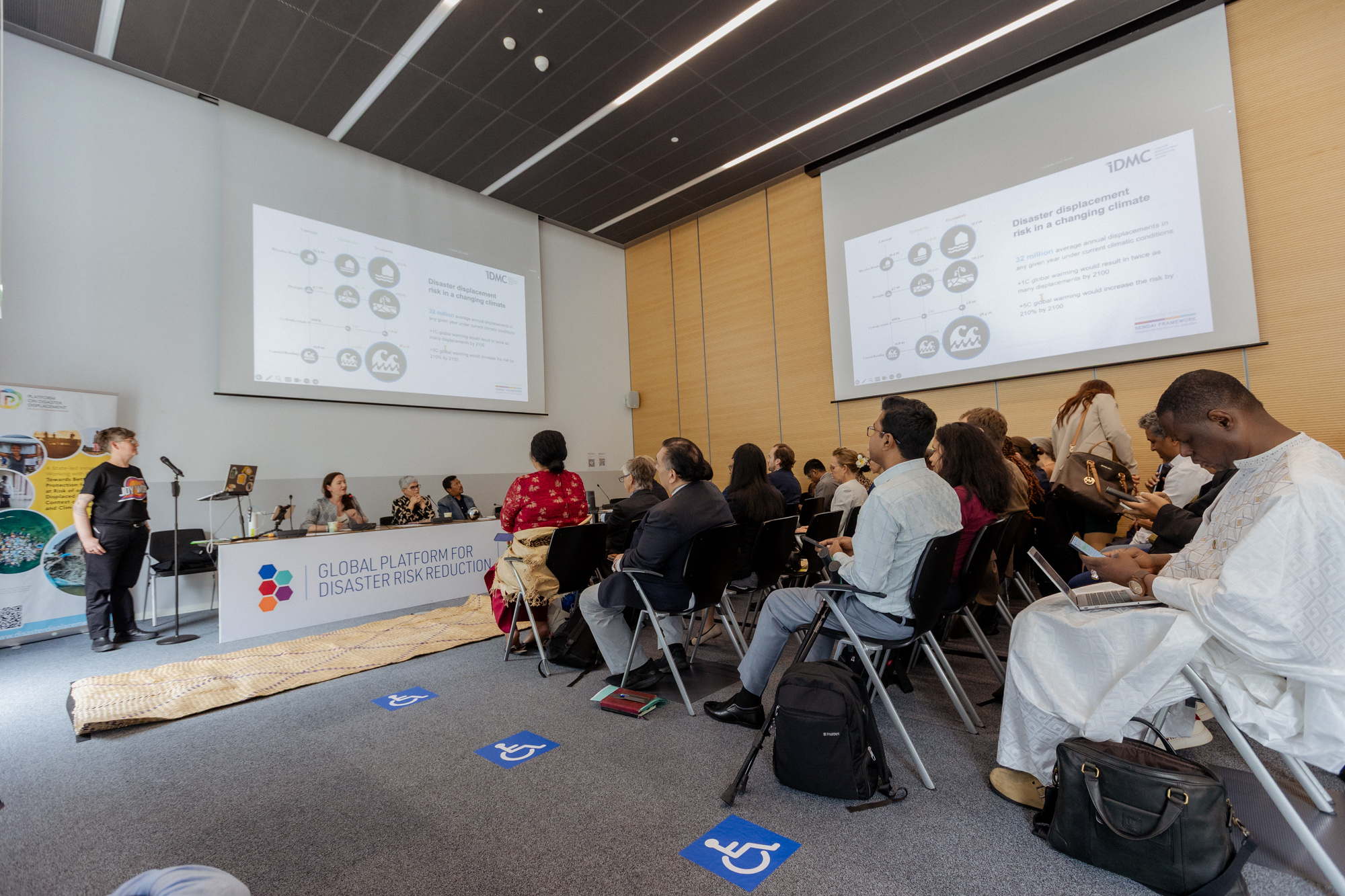Virtual Workshop Series Opening Plenary | Addressing Displacement and Migration in the Context of Disasters and Climate Change in Africa

On 27 April 2021, over 140 researchers and practitioners working across Africa, gathered online during the opening plenary of the Virtual Workshop Series on ‘Developing a Research and Policy Agenda for Addressing Displacement and Migration in the Context of Disasters and Climate Change in Africa’.
“Discussions about law and policy responses to displacement and migration in the context of disasters and climate change often focus on what we do not have. We do not have an international treaty for protecting those who move for environmental or climate-related reasons,” said Dr. Tamara Wood of the Kaldor Centre for International Refugee Law in her presentation.
“In this workshop series, we want to take a slightly different starting point, and look more closely at what we do have,” she insisted.
As a continent, Africa experiences some of the highest rates of displacement and migration associated with disasters and climate change worldwide. According to the Internal Displacement Monitoring Centre (IDMC), 3.4 million people were newly displaced in the context of disasters in 2019 in Sub-Saharan Africa. And the future does not look bright. The World Bank’s Groundswell Report estimates that up to 86 million people will become internal climate migrants in Sub-Saharan Africa by 2050 unless robust action is taken to mitigate and adapt to climate change and invest in development.
As the Nansen Initiative Protection Agenda highlights in its ‘toolbox approach, a number of frameworks and strategies exist at global, regional, sub-regional and national levels to address human mobility in the context of disasters, climate change and environmental degradation. Over the course of the next eight weeks, participants to the workshop series will engage across thematic working groups to plan future research to advance law and policy responses to these issues in Africa.
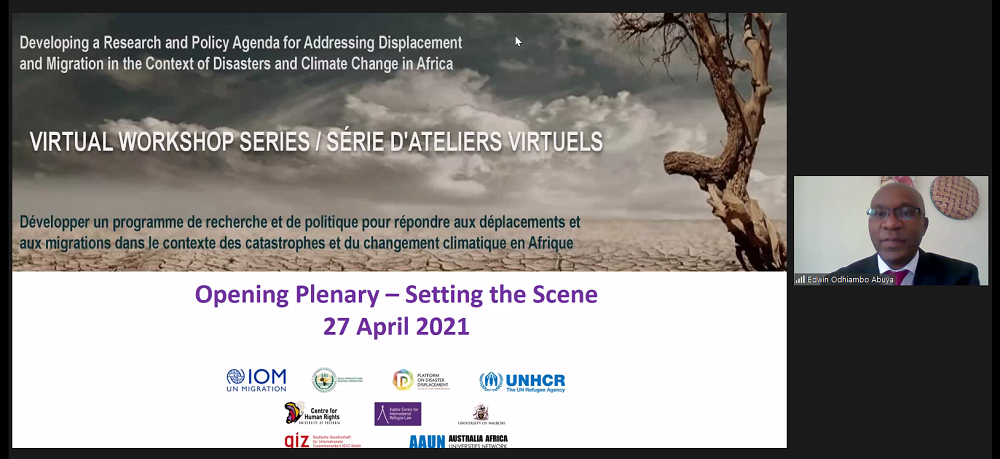
“Let us focus on the opportunities to address these challenges, because solutions exist”, remarked Ms. Fathia Alwan, Director of Health and Social Development, Intergovernmental Authority on Development (IGAD) during the event. “The network of researchers and policy experts across Africa, to be established, will provide a great opportunity to continue discussions; IGAD will lean on this network for future collaboration”.
Moreover, while lawful pathways for those who move across international borders in this context remain limited, and often uncertain, speakers highlighted in their interventions the crucial role existing legal and policy frameworks can play in helping communities stay at home, helping communities move out of harms’ way and protecting those displaced.
Examples of such frameworks include: the African Union’s 2018 ‘Revised Migration Policy Framework for Africa and Plan of Action (2018-2030)’ which calls on States to better address environmental causes of movement in their national and regional migration policies; and, the recently endorsed ‘Protocol for the Free Movement of Person in the IGAD Region’ (2020) which includes specific provisions for people moving across borders in the context of a disaster.
In the welcome remarks, representatives from the Platform on Disaster Displacement, the International Organization for Migration (IOM) and the United Nations High Commissioner for Refugees (UNHCR) also highlighted the need to strengthen and support collaboration among researchers, data actors, practitioners and policy makers in Africa, building on current projects underway such as the Multi Partner Trust Fund for Migration, the IOM-led project Implementing Global Policies on Environmental Migration and Disaster Displacement project in West Africa among others.
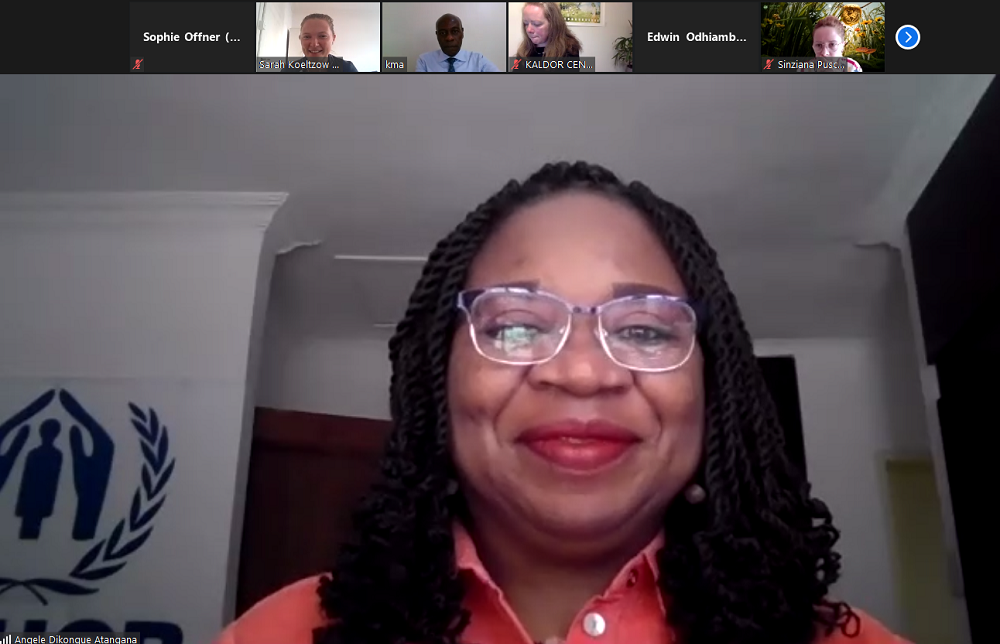
Africa, United Nations High Commissioner for Refugees (UNHCR)
Representatives from the University of Pretoria Centre for Human Rights, Deutsche Gesellschaft für Internationale Zusammenarbeit (GIZ), the University of Pretoria and Kaldor Centre UNSW spoke about the need to explore a range of law and policy tools tailored to addressing the different types of movement, the different stages of human mobility, and the different needs of those affected. They emphasized the critical role of national and regional actors, as well as local researchers and practitioners, in providing the skills and the in-depth knowledge needed to create effective responses and durable solutions.
Justice John Mativo, Judge at the High Court of Kenya and keynote speaker at the opening plenary, presented the role of climate change litigation and human rights litigation in addressing displacement in the context of climate change and disasters. He called for increased academic research and collaboration to support climate change and disaster displacement litigation in Africa, emphasizing the unique role of litigation “as a tool to either challenge the facial validity of these laws or to ensure that they are applied and enforced.”
“Litigation also pushes legislators and policymakers to be more ambitious and thorough in their approaches to climate change”, said Justice John Mativo, “[it] is a viable measure to address the constitutional right to a clean and healthy environment.”
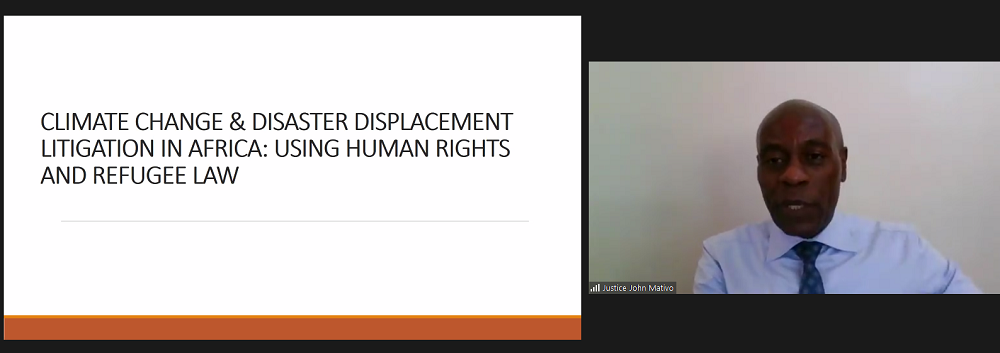
“Among the most destitute internally displaced persons I have ever met were the former pastoralists I spoke to in Southern Ethiopia some time ago,” said Prof. Walter Kaelin, Envoy of the Chair of the Platform on Disaster Displacement, during his keynote address. “One of their elders told me that they had no future: He said that even if I gave him lots of animals, he would not go back to his pastoralist lifestyle. He had lost everything twice since 2011 and felt that climate change will make things worse in the future.”
Prof. Kaelin highlighted the multi-causality and complexity of human mobility in the context of climate change and disasters. He outlined three key conceptualizations of human mobility in the context of climate change and disasters: the climate change approach, the migration approach and the disaster approach. According to Prof. Kaelin, this understanding of disaster displacement provides multiple entry points for research, practice, law and policy.
Organizing partners of the Virtual Workshop Series include PDD, IOM, UNHCR, IGAD, GIZ, University of Nairobi, University of Pretoria and Kaldor Centre, UNSW.
Over the coming weeks, the Virtual Workshop Series will provide an opportunity for academics and policy experts working across Africa and beyond to engage in discussion, form networks and plan future research on topics related to displacement and migration in the context of disasters and climate change in Africa.
For more information, and resources, you can explore the Virtual Workshop Series webpage here.
This Virtual Workshop Series will take place with the generous support of: International Organization for Migration (IOM); UN High Commissioner for Refugees (UNHCR); Deutsche Gesellschaft für Internationale Zusammenarbeit (GIZ); Platform on Disaster Displacement (PDD); and Africa-Australia Universities Network (AAUN)
Useful Links
Read Prof. Walter Kaelin’s Keynote Address:
 Loading...
Loading...
Learn more about our partner the Refugee Law Initiative
Learn more about the Virtual Workshop Series
Download the concept note (EN):
 Loading...
Loading...
Download the concept note (FR):
 Loading...
Loading...
Download the Background Paper (EN):
 Loading...
Loading...
Download the Background Paper (FR):
 Loading...
Loading...
Learn more about PDD’s work in our Workplan 2019-2022:
